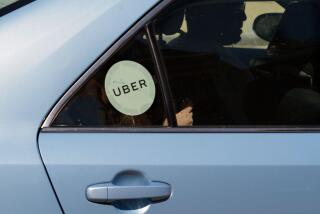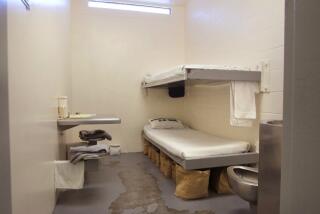Appellate Court Gives Admitted Drunk Chance to Make a Profit From His Crime
- Share via
Security guards who forced a drunken man to drive his car from an Irvine hotel parking lot toward waiting police may have to pay damages to the motorist for the emotional distress he claims he suffered in the incident.
An appellate court Tuesday fashioned what it acknowledged is a novel remedy for the admitted drunk driver, but not without dissent from one judge who belittled his brethren for giving the drunk a chance to profit from his crime.
The decision by the 4th District Court of Appeal in Santa Ana carves out a unique exception to legislation passed in 1978 that afforded sweeping legal protection to businesses that serve alcohol. All it means for plaintiff Lonnie Akers, however, is that he will get a chance to persuade a jury that he deserves compensation.
Akers, who was 18 and had a clean driving record, drank too much at an office party at the Irvine Marriott Hotel.
Two co-workers, concerned that Akers might try to drive home, disabled his car. They told security guards that they would hire a taxi for Akers, or persuade their friend to spend the night in the hotel.
But the guards “rejected the proposal and insisted that the co-workers repair the car, which they reluctantly did,” according to the opinion.
“While the repairs were being made, the security guards called the Irvine Police Department. After the car was repaired, the security guards insisted that Akers enter it and operate it as the means by which Akers was to leave (the hotel),” according to the opinion.
Police were waiting, and arrested Akers before he drove off the lot.
“Akers is entitled to legal protection against this reprehensible conduct,” concluded Justice Edward J. Wallin, who was joined by Justice Sheila Sonenshine for the majority in the split decision.
Akers’ lawyer in the civil case, Barnard F. Klein, said his client made a mistake when he pleaded guilty to drunk driving.
Klein said Akers could have won an acquittal if he had claimed he had been entrapped. Or Akers could have entered a plea of no contest, accepting punishment but not admitting guilt, Klein added.
The key factor in the decision was the guards’ alleged interference with the co-workers who were trying to prevent Akers from taking the wheel, Klein said.
Klein suggested that the hotel, which is the defendant in the case, could have made money by selling Akers a room for the evening.
The 1978 legislation states that it is the consumption, rather than the serving, of alcoholic beverages that is the legal cause of injuries inflicted by drunk drivers.
Marriott lawyer Charles H. Carpenter said the hotel was “seriously contemplating” asking for a rehearing.
Akers claimed unspecified damages covering legal fees and court costs in his drunk-driving case, higher auto insurance costs, loss of liberty and driving privileges, and humiliation and mental anguish suffered as a result of the “malicious” action of the hotel guards.
In an acid dissent, Justice Thomas F. Crosby Jr. wrote that he found it “rather obvious” that Akers is not entitled to damages “for the consequences of the conviction.”
Crosby pointed to an 18th-Century British case in which one highwayman sued another, claiming that he had been cheated out of his share of loot. The result was each was hanged, and the lawyer was fined for contempt of court for filing the case.
“Criminal defendants take note,” Crosby concluded. “What is lost in the battle with the prosecutor may, according to the majority, be recouped in a tort action against those who put you up to it. Now that’s equal protection of the law.”
More to Read
Sign up for Essential California
The most important California stories and recommendations in your inbox every morning.
You may occasionally receive promotional content from the Los Angeles Times.













